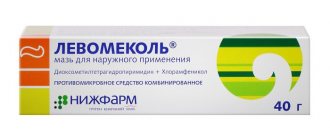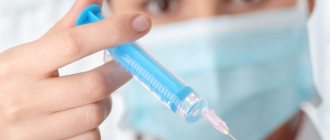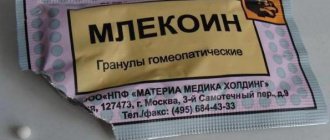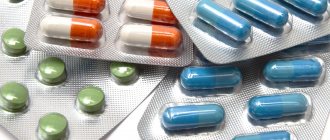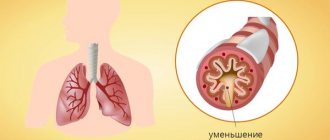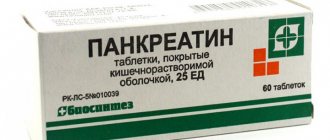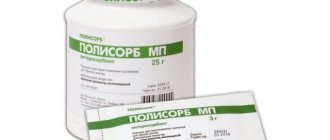Characteristics of the medicine
Bioparox is an effective drug with antibacterial and anti-inflammatory effects on the body. The antibacterial effect of such a medication is to inhibit the reproduction and growth of various types of pathogenic microorganisms.
The main active ingredient of this product is the polypeptide antibiotic Fusafungin. Bioparox during breastfeeding can reduce the inflammatory process and eliminate swelling of the respiratory system. Penetrating the oral mucosa, the drug immediately begins to actively influence the source of inflammation. The use of such a local antibiotic helps stop the further spread of pathogens inside the body and prevent the development of dangerous complications. The use of Bioparox for breastfeeding helps the mother in a short time to cope with an infection of bacterial origin, which provokes the development of sinusitis, bronchitis and sore throat.
Why and in what cases is it used?
Bioparox during breastfeeding is most often prescribed:
- with tracheitis - an infectious lesion of the mucous membrane of the trachea,
- with laryngitis - an inflammatory process of the laryngeal mucosa of infectious origin,
- with pharyngitis - an inflammatory process of the mucous membrane in the pharynx,
- with nasopharyngitis - catarrhal inflammatory process of the mucous membranes of the upper respiratory tract,
- with bronchitis,
- with tonsillitis,
- for rhinitis,
- for sinusitis,
- with sinusitis,
- in the postoperative period for tonsil resection.
Bioparox during lactation is prescribed when a nursing mother is diagnosed with a sore throat or sinusitis. At the same time, for angina the drug is effective only in the initial stages of the disease. The medicine is more active for chronic tonsillitis. Since Bioparox is a local antibiotic, it is not effective for acute tonsillitis (tonsillitis).
Sinusitis is susceptible to treatment with this remedy in the initial stages of the disease. In the acute course of the disease, the drug is prescribed only in complex therapy with stronger drugs.

Can the medicine be used for breastfeeding?
Many types of antibacterial drugs are prohibited for use during drug therapy during pregnancy. Bioparox is practically not absorbed into the blood and has only a local effect on the surface of the respiratory mucosa. The attached instructions indicate that no studies have been conducted on the likelihood of the drug entering breast milk and in what dosage. It is for this reason that the use of such an antibacterial drug during pregnancy and lactation should only be carried out under the supervision of a specialist.
At the same time, a small part of such an antibiotic still passes into the mother’s milk, so during the entire period of treatment the child’s reaction to taking such a medication should be monitored. Numerous reviews from women about the use of Bioparox indicate that children in rare cases develop allergies and other negative reactions to this product.
Only the attending physician should prescribe such a local antibiotic, taking into account the severity of the pathology and the possible consequences for the woman and child.
If eliminating the pathology of the respiratory system is impossible without the use of Bioparox, then it is recommended to stop breastfeeding the child for the period of treatment. Typically, the course of treatment with such an antibiotic is 7 days, and during this period it is recommended to transfer the baby to artificial feeding. After the end of drug therapy, when the desired effect is achieved, the use of Bioparox is completed, and the nursing mother can begin to put the baby to the breast again.
The effect of bioparox on the body of mother and child during breastfeeding
During lactation, the woman’s immune system weakens, and the young mother becomes susceptible to various viral infections.
Some experts recommend using bioparox during breastfeeding.
In order to avoid the pathological consequences of using this medicine for a nursing mother and baby, it is necessary to understand the mechanism of action of this medicinal substance and its side effects.
Basic principles of bioparox action
When a woman catches a cold during breastfeeding, treatment usually begins with the use of proven home remedies. However, if within 2 - 3 days regular raspberry tea, mustard plasters and thermal procedures do not give the expected effect, you need to think about more effective treatment.
Of course, during lactation it is not recommended to self-medicate, and at the first signs of an acute respiratory infection you should consult a doctor. Colds in a nursing mother can easily be complicated by pneumonia, bronchitis or other respiratory pathologies.
Antibiotics should be a fairly important component of therapy for colds. However, most of them have an effect on the entire woman’s body and cannot be used during breastfeeding.
In this case, the local inhalation antibiotic Bioparox, introduced into widespread practice by the French pharmaceutical company Servier, can come to the aid of the patient. The use of this medicinal substance helps solve a number of problems in the treatment of inflammatory diseases of the upper respiratory tract.
When breastfeeding, Bioparox replaces several medications at once. Due to its anti-inflammatory effect on tissue, the French medicinal substance prevents:
- swelling of the patient’s nasal and throat mucosa;
- strengthens the walls of blood vessels;
- prevents excessive fluid secretion at the site of inflammation;
- has an overwhelming effect on most representatives of pathogenic flora, which brings the recovery of the young mother closer.
Thanks to its main component fusafugin, this drug quickly minimizes all manifestations of the disease: runny nose and nasal congestion disappear, sore throat goes away, high body temperature returns to normal.
Benefits of using the drug
A distinctive feature of this antibiotic is its aerosol form of release and the ability to use the therapeutic effect directly at the site of inflammation.
The bottle is equipped with two special nozzles that allow you to administer the medicine separately into the patient’s nose and throat.
Thanks to this method of application, microparticles act directly on the tissues of the bronchi and lungs affected by the inflammatory process.
The antibiotic has an exclusively local therapeutic effect and practically does not enter the woman’s vascular bed. This explains the possibility of using the drug in young children, pregnant women and chronically ill patients.
Another positive quality of bioparox is the absence of addiction to various bacteria that cause problems in the upper respiratory tract in patients. This makes it possible to carry out long courses of treatment without the usual breaks necessary to restore the sensitivity of the pathological flora to the medication.
An inhaled antibiotic of French origin goes well with the use of other drugs in the treatment of acute respiratory infections. Modern non-steroidal hormones, vitamins and antipyretic drugs do not come into pharmacological conflict with this drug.
We recommend reading the article about the treatment of sinusitis during breastfeeding. From it you will learn about the causes of the disease in a nursing woman, types of sinusitis and their symptoms, methods of treating the disease in women during lactation.
Using bioparox during breastfeeding
The manufacturers of this drug themselves note that the question of how bioparox works during lactation has not been thoroughly studied. Pediatricians and obstetricians-gynecologists also have not developed a common point of view on the use of this substance during breastfeeding.
Bioparox is practically not absorbed into the blood of a young mother, therefore, cannot enter the baby’s body through breast milk. However, this postulate has not yet been 100% confirmed, so the responsibility for using an antibiotic during lactation falls on the local doctor and the woman herself.
Usually, when introducing an inhaled antibacterial agent into the regimen, the doctor takes into account the severity of the woman’s condition and the need for complex treatment of the inflammatory process of the upper respiratory tract. At the same time, the risk of pathological effects of the drug on the baby should not exceed the therapeutic advisability for the young mother.
The attitude towards the use of bioparox should be the same as towards any new food product introduced into the diet of a nursing woman. If there is a negative reaction of the child's body to this medicine, the use of the respiratory antibiotic should be stopped.
When the severity of a woman’s condition requires the use of powerful drugs in the treatment of the disease, breastfeeding is suspended. The course of antibiotic treatment usually takes 7-10 days, during which time the baby is bottle-fed.
Since bioparox does not accumulate in the tissues of the female body and does not penetrate the vascular bed, after the end of antibacterial therapy, you can continue to breastfeed the baby.
Side effects from use
Although this drug has an exclusively local effect on the female body, side effects are possible when using it:
| By-effect | How it manifests itself |
| Various skin allergic reactions | They can present as a rash on the chest, limbs and face, itching and irritation of the mucous membranes of the nose and throat are possible. |
| Allergic responses from the respiratory system | Shortness of breath and a feeling of lack of oxygen may occur when Bioparoxa is included in the treatment regimen. In severe cases, doctors noted the development of asthma attacks and pulmonary edema. Such manifestations require immediate hospitalization and specialized treatment. |
| Local manifestations | Dryness and irritation of the nasopharyngeal mucosa, burning in the throat and numbness of the root of the tongue are possible in 7 - 10% of cases of using the medicine. |
Despite the fact that bioparox for breastfeeding is the safest and gentlest drug for the baby, it should be treated with caution. The use of this inhaled antibiotic is possible only in consultation with the attending physician and in most cases requires stopping breastfeeding for the period of treatment of the inflammatory disease in the mother.
Source: https://GrudInfo.ru/bioparoks-pri-grudnom-vskarmlivanii/
Contraindications to the drug
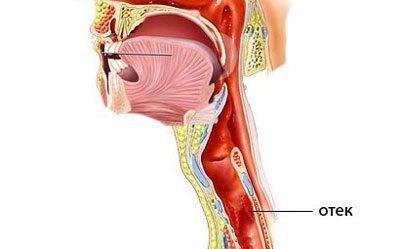
Despite the high effectiveness of such an antibacterial drug in the treatment of pathologies of the respiratory system, in some cases its use is not advisable. This drug is contraindicated in the following cases:
- danger of allergies;
- sensitivity to some components of the drug;
- child's age up to 12 years.
A local antibiotic such as Bioparox during lactation can cause side effects that a nursing mother needs to be aware of. Treatment with this medication may be accompanied by the development of:
- severe irritation in the throat area;
- dryness in the nasopharynx;
- suffocation;
- severe swelling of the larynx.
It is important to remember that when breastfeeding, Bioparox can be used to eliminate pathologies only as prescribed by a doctor. The fact is that only a doctor can determine all the risks of treatment with antibacterial agents during lactation.
Reviews from mothers: Bioparox - friend or foe to babies?
The reaction of a young mother to a cold, sore throat or ARVI is fear and excitement. Don't forget that you are not the first to encounter such a problem. What do women who used it while feeding their baby say about this antibacterial aerosol? Reviews of Bioparox treatment during breastfeeding are optimistic.
Most patients told doctors that after 2-3 sprays of the product they felt relief, and the little one’s condition remained good. Some mothers were unlucky: the child developed an allergic reaction in the form of a skin rash, which, however, disappeared safely after stopping local antibiotic therapy.
Features of using the medicine
The main form of production of Bioparox is an aerosol, that is, it is intended for inhalation in various ways. At the very beginning of using the aerosol, you need to activate the balloon by simply pressing it several times.
Bioparox spray is often prescribed to eliminate respiratory pathologies such as rhinitis, sinusitis and nasopharyngitis. Before introducing an antibiotic into the nose, it is necessary to free it from accumulated mucus. Before use, Bioparox should be positioned vertically, with the nozzle pointing upward. When treating pathologies of the respiratory system in women during lactation, it is recommended to wear a yellow nozzle, and a transparent one is intended for irrigating the nasopharynx in children. The nozzle must be carefully placed in the nostril, clamping the second nasal passage and closing the oral cavity. After this, you need to take a deep breath through your nose and press the balloon with your finger.
Bioparox is effective in the fight against pathologies such as pharyngitis, tonsillitis and rickets. When treating them, it is recommended to use a white nozzle, which is inserted into the mouth and pressed well with the lips. Along with a deep breath, pressure is applied to the bottom of the balloon, and there is no need to hold your breath with this method of treatment. With drug therapy for a disease such as tracheitis, you will still have to hold your breath for several minutes immediately after pressing the balloon.
How to treat while breastfeeding
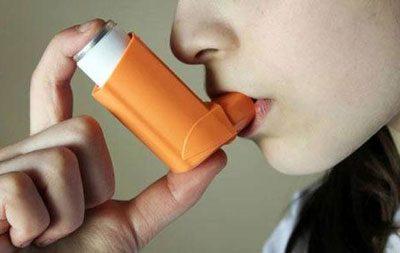
The course of drug treatment with Bioparox lasts no more than 10 days, and with proper pumping it is possible to preserve milk during the illness. After the woman recovers, she will be able to put the baby to the breast again and establish the lactation process. In case of illness, Bioparox aerosol should be used according to a certain scheme - inject the medicine every 4 hours . The inhalation procedure includes 4 injections into the oral cavity or two injections into each nostril. It is important to remember that the course of treatment is determined by the attending physician, but using such an antibiotic for too long is contraindicated.
Bioparox is an effective local antibiotic that can be used to eliminate respiratory diseases. This drug is often used to eliminate pathologies in women when feeding a small child, but only a specialist should prescribe it. You should stop breastfeeding for the entire period of treatment, because a small amount of this medicine still passes into the milk.
Bioparox during breastfeeding: can it be used, contraindications and instructions
During the off-season, influenza viruses attack without sparing anyone. Especially during this period it is “hard” for nursing mothers and pregnant women. Since the treatment and choice of drugs is strictly limited. What drugs are allowed for breastfeeding and can a nursing mother take Bioparox?
About the drug
This drug is an excellent local anti-inflammatory and antibacterial agent. Available in the form of an aerosol spray with a clear, oily liquid.
Fusafungin is the main active ingredient. In addition, it is a local antibiotic. Has an anti-inflammatory effect. Active where streptococci, staphylococci, mycoplasma, and candida are found.
Mechanism of action
When it enters the oral or nasal cavity, the drug is evenly distributed throughout the mucous membranes, creating a protective film. A very small amount of substance passes through the hemolytic barrier.
A tiny content of fusafungine is detected in the blood plasma, which makes Bioparox safe during breastfeeding. Next, the drug is distributed and enters the trachea, and then the lungs.
As a result, a decrease in the production of large amounts of exudate, relief of swelling in the nasal passages and restoration of breathing. The earlier the medicine is used, the more effectively it works.
Why and in what cases is it used?
Bioparox during breastfeeding is most often prescribed:
- with tracheitis - an infectious lesion of the mucous membrane of the trachea;
- with laryngitis - an inflammatory process of the laryngeal mucosa of infectious origin;
- with pharyngitis - an inflammatory process of the mucous membrane in the pharynx;
- with nasopharyngitis - catarrhal inflammatory process of the mucous membranes of the upper respiratory tract;
- with bronchitis;
- with tonsillitis;
- for rhinitis;
- for sinusitis;
- with sinusitis;
- in the postoperative period for tonsil resection.
Bioparox during lactation is prescribed when a nursing mother is diagnosed with a sore throat or sinusitis. At the same time, for angina the drug is effective only in the initial stages of the disease. The medicine is more active for chronic tonsillitis. Since Bioparox is a local antibiotic, it is not effective for acute tonsillitis (tonsillitis).
Sinusitis is susceptible to treatment with this remedy in the initial stages of the disease. In the acute course of the disease, the drug is prescribed only in complex therapy with stronger drugs.
Lactation and Bioparox
Only a doctor prescribes Bioparox for nursing mothers. Since there is no information about its effect on a small child. Human studies of this product have not been conducted. There is only data on the effect of fusafugine on pregnant and lactating animals. No negative reactions to the drug were observed.
Since the concentration of the active substance in the blood plasma is insignificant, doctors prescribe it to their patients. It is not known whether the medication passes into breast milk and in what concentrations.
Therefore, a possible risk to the infant cannot be excluded. Therefore, some experts still advise stopping breastfeeding while using it.
Or a nursing mother can express milk during the first three to four hours after using the medicine.
According to the instructions for use, the use of the drug for medicinal purposes during breastfeeding is not recommended.
When using this medicine, it is necessary to monitor the child’s reaction to it.
In addition, Dr. Komarovsky is also against this medication. He considers it an absolutely ineffective and useless remedy used to treat sore throats and tonsillitis, and other diseases of the upper respiratory tract.
Analogs
Medicines that are similar in their mechanism of action to Bioparox:
- all types of Grammidin;
- Trachisan;
- Isofra;
- Polydex;
- Hexoral;
- Inhalipt;
- Kameton;
- Miramistin;
- Cameton.
All these drugs are actively used in the treatment of diseases of the upper respiratory tract. But most of them are prescribed in complex therapy. Self-medication during lactation is contraindicated. Any drug that seems harmless can cause irreparable harm to an infant. Therefore, you should consult your doctor before using them.
Advantages and disadvantages
The pros and cons of this medication include:
ProsCons
| The disease stops developing after the first use | High price |
| Highly effective in the initial stages of the disease | Its effect during pregnancy and lactation has not been fully studied |
| Available remedy | Unpleasant taste after the procedure |
| Convenient to use | May cause allergic reactions |
| Wide spectrum of action | Dries out the mucous membrane of the throat |
| The kit includes various attachments | There have been cases of a burning sensation |
At the moment, the drug has been withdrawn from the Russian market by order of Rosgoszdravnadzor, this is due to the fact that in September 2015, studies on the side effects of the drug were started. In Italy, severe cases of allergic reactions to the drug with fatal consequences have been reported. In addition, cases of anaphylactic shock and bronchospasms have been identified in children and adults after using this drug. The manufacturing company Servier was charged with creating drugs that have severe side effects that threaten the life and health of patients. The Versailles court satisfied the claims of patients who suffered from the drugs of this company. Thus, before using a medicine, you need to make sure it is safe and be sure to consult a specialist. This is especially important during breastfeeding and pregnancy. Since during these periods a woman is responsible not only for her health, but also for the health of her child.
Source: https://laktacia.ru/krasota-i-zdorove-v-period-laktacii/lechenie-kormyashchej-mamy/bioparoks-pri-grudnom-vskarmlivanii.html
